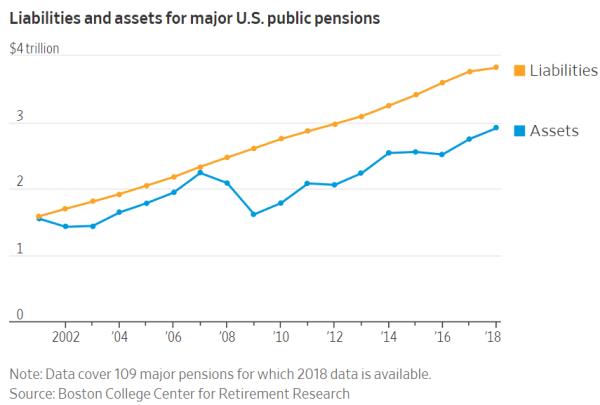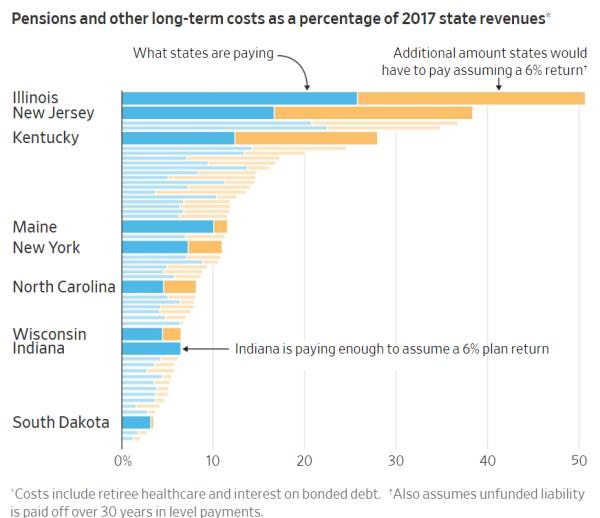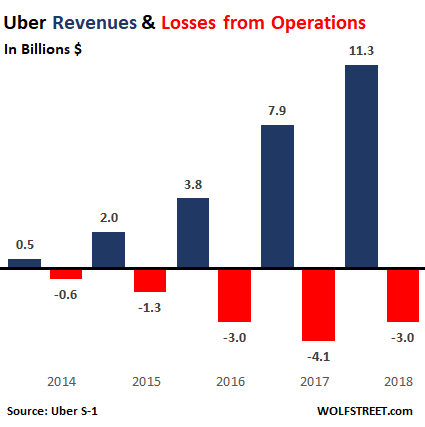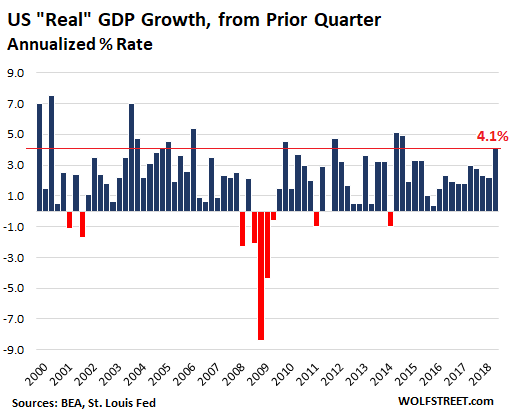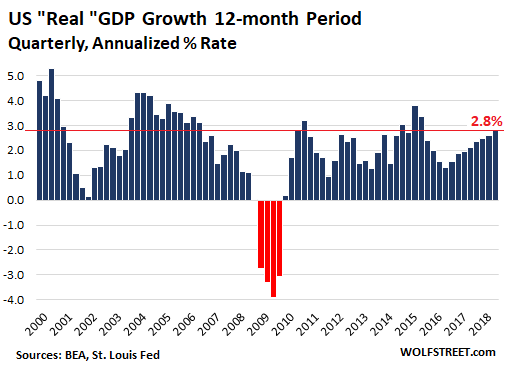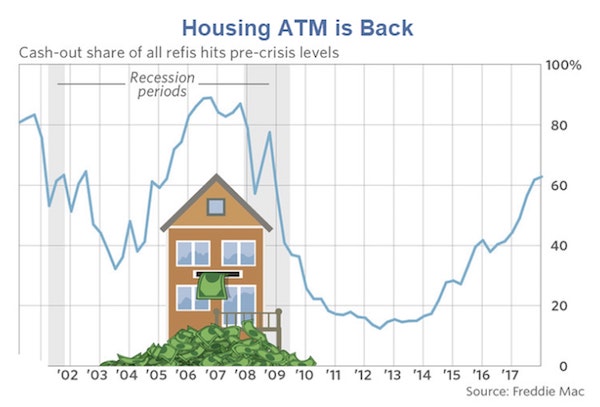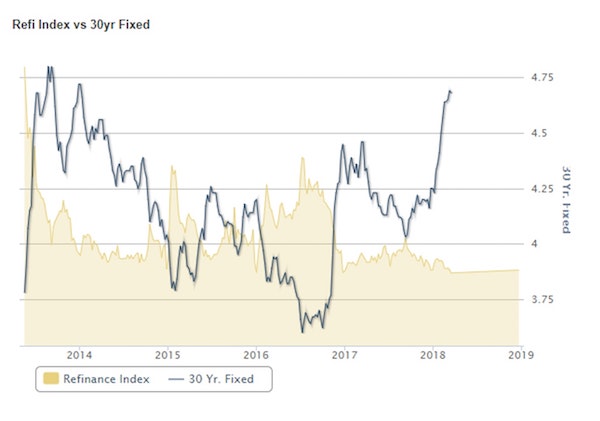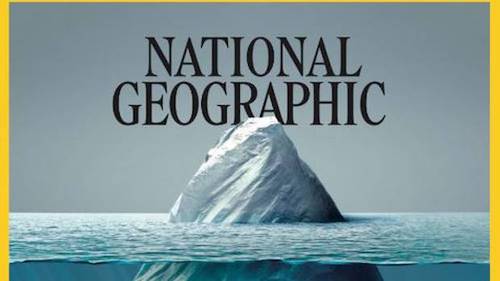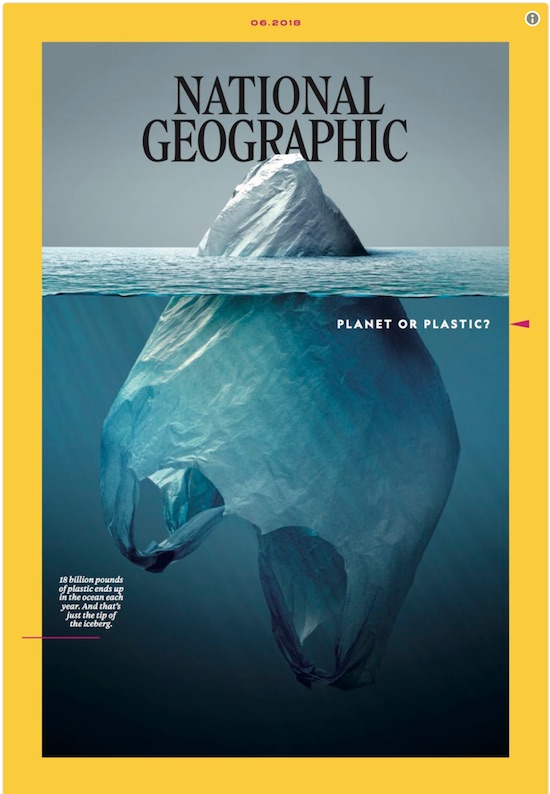
Elliott Erwitt California, USA 1956

• US records highest Covid-19 deaths in single day: More than 1,970 deaths were recorded on Tuesday with some states yet to share their totals.
• U.S. reports 30,706 new cases of coronavirus and 1,970 new deaths. Total of 398,785 cases and 12,893 deaths.
• Reported US coronavirus deaths @ryanstruyk @CNN:
– 4 weeks ago: 31 deaths
– 3 weeks ago: 111 deaths
– 2 weeks ago: 704 deaths
– 1 week ago: 3,834 deaths
Right now: 12,893 deaths
• In New York City, 149,558 people have been tested for coronavirus so far.
– 50% of them tested positive.
• @Amy_Siskind: 2,000 American died today alone. 400,000 reported cases in the US. The US mortality rate is now 3.2%. At 1,000 deaths it was at 1.5% and has been steadily rising. The mortality rate of the 1918 flu was 2.5%. For the flu is it <0.1%
Trend 1: the US accounts for a higher proportion of worldwide cases and deaths each day.
* US now accounts for 15.7% of all deaths, up from 9% one week ago.
* US accounts for 28% of all worldwide cases, up from 25% 2 days ago.
We make up 4.2% of the world population.

• Cases 1,446,981 (+ 87,971 from yesterday’s 1,359,010)
• Deaths 83,090 (+ 7,190 from yesterday’s 75,900)

From Worldometer yesterday evening -before their day’s close-
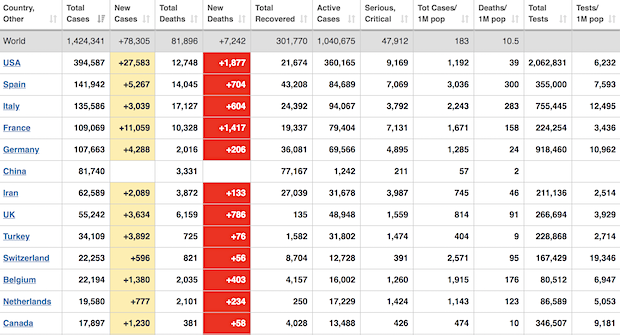
From Worldometer -NOTE: mortality rate for closed cases is at 21% !–
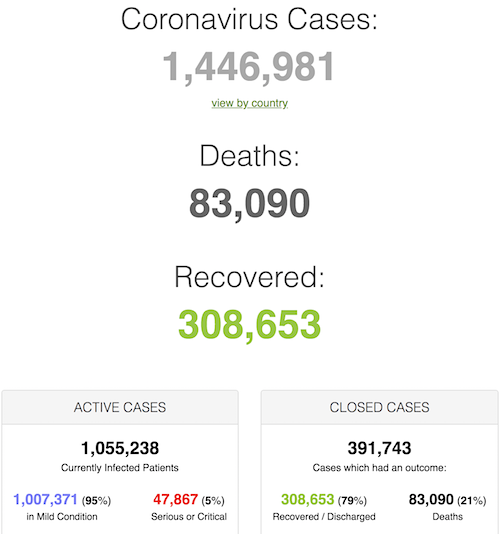
From SCMP:
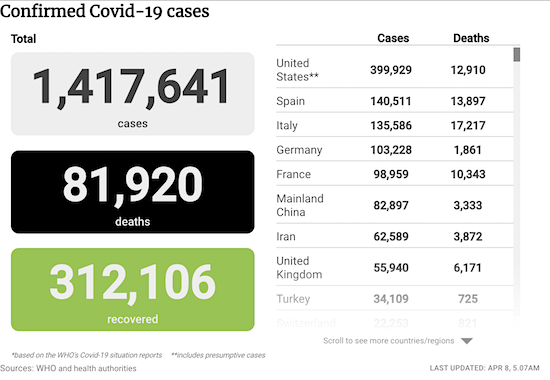
From COVID2019Info.live:
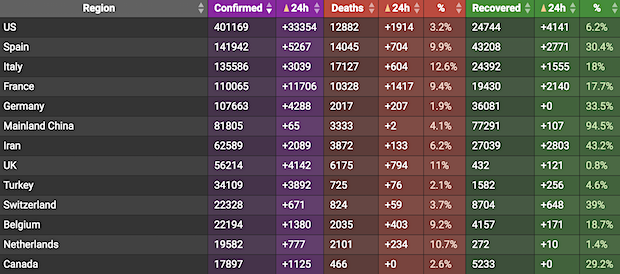

Sometimes I feel like I’m the only one hammering away at this, so this is good to see, coming from two doctors.
You can forget about re-opening your economy without all-out testing. You can forget about travel if you haven’t been tested. At least twice.
But universal testing is still very far away. All we see is countries inventing excuses to not test. I haven’t seen one that has tested even 1% of its population.
• To End the Pandemic, Give Universal Testing the Green Light (Patel/Patel)
We have no idea what the spread of this virus truly is thanks to costly under-testing at the start of this pandemic, but all of the evidence points to mass testing as the only way out of a perpetual cycle of social distancing and caseload spikes. Social distancing is buying us time, but without universal testing, this period of pause delays the inevitable. That’s why we’re calling for a national mobilization to create a universal testing program for every American. Such a program should categorize people in three ways: they had Covid-19, they have Covid-19, or they are still at risk for getting Covid-19. Green, Red, Yellow—that simple, no more uncertainty. It would use two types of tests to accomplish this categorization.
The Two Types of Tests for Covid-19. When testing for Covid-19, we can look at the presence of either (1) the actual viral antigen during infection or the (2) antibodies during the middle stage of infection and after. (For the sake of simplicity we are only going to talk broadly about the antibody test as one type of antibody.) Covid-19 testing in the US currently is focused on antigen testing; a nasal swab is used to test for the presence of Covid-19 proteins in your mucus. Such tests need to be made widely available in ways that do not clog our emergency rooms. Mobile testing for at risk seniors as well as rapid expansion of drive through testing facilities, or even self-administered home swab kits that can be securely sent to labs can help rapidly identify those who need to be on the strictest quarantine (Red).
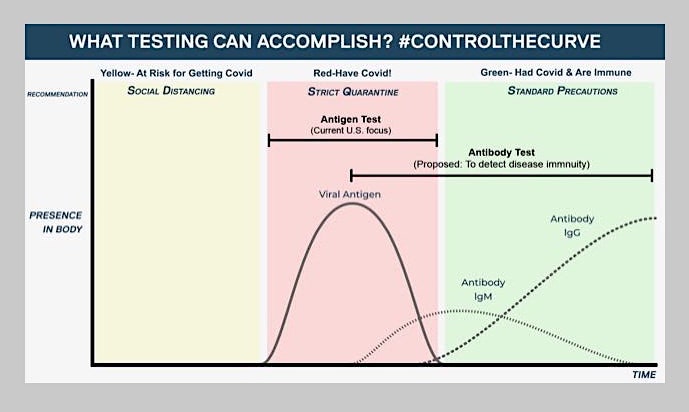
Data Visualization: Suraj Patel And Viral Patel
We also need to increase the capacity to read these tests. South Korea reported its first Covid-19 case the same day as the USA, but had six times the testing capacity per capita. Fortunately, the science behind analyzing Covid-19 antigen tests is widely available—university labs, commercial labs, and the government all have the equipment needed to read them. They just need to be set up for testing and approved to analyze samples. That requires no medical breakthrough, just political leadership, which may be the taller order right now. These antigen tests, however, can only tell providers if a person has an active Covid-19 infection or are asymptomatic carriers.
We also need to approve serological blood and/or ELISA antibody tests that can be rapidly deployed to detect disease immunity. In some cases these tests can be self-administered at home to test for immunity from Covid-19. This isn’t a fairy tale idea. Public Health England is attempting to make millions of 15-minute at-home testing kits available to the general public at pharmacies and via mail the moment one of the tests proves efficacious. The UK’s first options just recently failed, but the science behind antibody tests tell us it is a matter of when, not if one of these tests are successful.

This is devastating. Italy, France, Spain have terrible numbers of their own, overwhelmed health care, you name it.
On the bright side, Boris kept the pubs open for two more weeks.
• UK To Have More Corona Deaths Than Italy, Spain, France, Germany Combined (G.)
World-leading disease data analysts have projected that the UK will become the country worst hit by the coronavirus pandemic in Europe, accounting for more than 40% of total deaths across the continent. The Institute for Health Metrics and Evaluation (IHME) in Seattle predicts 66,000 UK deaths from Covid-19 by August, with a peak of nearly 3,000 a day, based on a steep climb in daily deaths early in the outbreak. The analysts also claim discussions over “herd immunity” led to a delay in the UK introducing physical distancing measures, which were brought in from 23 March in England when the coronavirus daily death toll was 54. Portugal, by comparison, had just one confirmed death when distancing measures were imposed.
The IHME modelling forecasts that by 4 August the UK will see a total of 66,314 deaths – an average taken from a large estimate range of between 14,572 and 219,211 deaths, indicating the uncertainties around it. The newly released data is disputed by scientists whose modelling of the likely shape of the UK epidemic is relied on by the government. Prof Neil Ferguson, of Imperial College London, said the IHME figures on “healthcare demand” – including hospital bed use and deaths – were twice as high as they should be. The IHME, which is responsible for the ongoing Global Burden of Disease study, calculated the likely need for hospital admissions and intensive care beds and projected deaths in European countries hit by Covid-19.
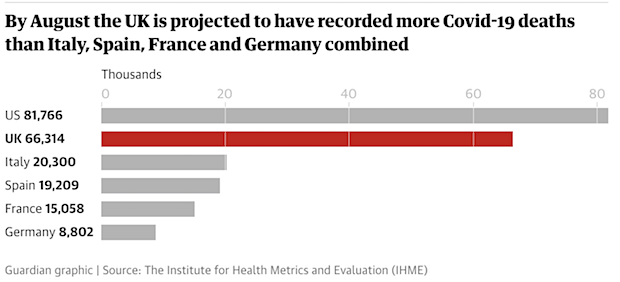
Looking at the measures taken by the UK to curb the spread of the disease, the institute says the peak is expected in 10 days’ time, on 17 April. At that point the country will need more than 102,000 hospital beds, the IHME says. There are nearly 18,000 available, meaning a shortfall of 85,000. The same grim picture applies to intensive care beds. At the peak, 24,500 intensive care beds will be needed and 799 are available, the analysts predict. There will be a need for nearly 21,000 ventilators, they say. At the peak the UK will see 2,932 deaths a day, the IHME forecasts. The death toll in other European countries that are now struggling with Covid-19 will be lower, they say. Spain is projected to have 19,209 deaths by the same date, Italy 20,300 and France 15,058. All three countries have imposed tougher lockdown measures than the UK.

Not an excuse for Boris anymore than it is for Trump, but it does tell us somethinng about what passes for science.
• Boris Johnson’s Scientists Were Slow To Sound The Alarm (R.)
It was early spring when British scientists laid out the bald truth to their government. It was “highly likely,” they said, that there was now “sustained transmission” of COVID-19 in the United Kingdom. If unconstrained and if the virus behaved as in China, up to four-fifths of Britons could be infected and one in a hundred might die, wrote the scientists, members of an official committee set up to model the spread of pandemic flu, on March 2. Their assessment didn’t spell it out, but that was a prediction of over 500,000 deaths in this nation of nearly 70 million. Yet the next day, March 3, Prime Minister Boris Johnson was his cheery self. He joked that he was still shaking hands with everyone, including at a hospital treating coronavirus patients.
“Our country remains extremely well prepared,” Johnson said as Italy reached 79 deaths. “We already have a fantastic NHS,” the national public health service, “fantastic testing systems and fantastic surveillance of the spread of disease.” Alongside him at the Downing Street press conference was Chris Whitty, the government’s chief medical adviser and himself an epidemiologist. Whitty passed on the modelling committee’s broad conclusions, including the prediction of a possible 80% infection rate and the consequent deaths. But he played them down, saying the number of people who would be infected was probably “a lot lower” and coming up with a total was “largely speculative.”
The upbeat tone of that briefing stood in sharp contrast with the growing unease of many of the government’s scientific advisers behind the scenes. They were already convinced that Britain was on the brink of a disastrous outbreak, a Reuters investigation has found. [..] interviews and documents also reveal that for more than two months, the scientists whose advice guided Downing Street did not clearly signal their worsening fears to the public or the government. Until March 12, the risk level, set by the government’s top medical advisers on the recommendation of the scientists, remained at “moderate,” suggesting only the possibility of a wider outbreak.

That throws another 1000 theories out the window.
• Low Antibody Levels Raise Questions About Coronavirus Reinfection Risk (SCMP)
Researchers in Shanghai hope to determine whether some recovered coronavirus patients have a higher risk of reinfection after finding surprisingly low levels of Covid-19 antibodies in a number of people discharged from hospital. A team from Fudan University analysed blood samples from 175 patients discharged from the Shanghai Public Health Clinical Centre and found that nearly a third had unexpectedly low levels of antibodies. In some cases, antibodies could not be detected at all. “Whether these patients were at high risk of rebound or reinfection should be explored in further studies,” the team wrote in preliminary research released on Monday on Medrxiv.org, an online platform for preprint papers.
Although the study was preliminary and not peer-reviewed, it was the world’s first systematic examination of antibody levels in patients who had recovered from Covid-19, the disease caused by the coronavirus, the researchers said. All of the patients had recently recovered from mild symptoms of the disease and most of those with low antibody levels were young. The researchers excluded patients who had been admitted to intensive care units because many of them already had antibodies from donated blood plasma. Antibodies are generated by the immune system and have unique chemical structures to inhibit specific pathogens. The coronavirus antibody intercepts the spike protein on the viral envelope to prevent it from binding with human cells.
The researchers said they were surprised to find that the antibody “titer” value in about a third of the patients was less than 500, a level that might be too low to provide protection. “About 30 per cent of patients failed to develop high titers of neutralising antibodies after Covid-19 infection. However, the disease duration of these patients compared to others was similar,” they said. The team also found that antibody levels rose with age, with people in the 60-85 age group displaying more than three times the amount of antibodies as people in the 15-39 age group. The low amounts of antibodies could affect herd immunity, resistance to the disease among the general population to stop its spread.
“This is a clinical observation we made at the front line. What this will mean to herd immunity will require more data from other parts of the world,” Professor Huang Jinghe, the leader of the team, said on Tuesday. Huang said 10 of the patients in the study had an antibody presence so low it could not even be detected in the laboratory. These patients experienced typical Covid-19 symptoms including fever, chill and a cough, but might have beaten back the virus with other parts of the immune system such as T-cells or cytokines. How they did this was still unclear. “Vaccine developers may need to pay particular attention to these patients,” Huang said. If the real virus could not induce antibody response, the weakened version in the vaccine might not work in these patients either.

Two trends appear: people dying at home, and blacks dying in far larger -relative- numbers.
• Staggering Surge Of NYers Dying In Their Homes (Gothamist)
If you die at home from the coronavirus, there’s a good chance you won’t be included in the official death toll, because of a discrepancy in New York City’s reporting process. The problem means the city’s official death count is likely far lower than the real toll taken by the virus, according to public health officials. It also means that victims without access to testing are not being counted, and even epidemiologists are left without a full understanding of the pandemic. As of Monday afternoon, 2,738 New York City residents have died from ‘confirmed’ cases of COVID-19, according to the city Department of Health. That’s an average of 245 a day since the previous Monday.
But another 200 city residents are now dying at home each day, compared to 20 to 25 such deaths before the pandemic, said Aja Worthy-Davis, a spokeswoman for the medical examiner’s office. And an untold number of them are unconfirmed. That’s because the ME’s office is not testing dead bodies for COVID-19. Instead, they’re referring suspected cases to the city’s health department as “probable.” “If someone dies at home, and we go to the home and there [are] signs of influenza, our medical examiner may determine the cause of death was clearly an influenza-like illness, potentially COVID or an influenza-like illness believed to be COVID,” said Worthy-Davis. “We report all our deaths citywide to the health department, who releases that data to the public.”
But the health department does not include that number in the official count unless it is confirmed, a spokesman said. “Every person with a lab confirmed COVID-19 diagnosis is counted in the number of fatalities,” the spokesman, Michael Lanza, said in an email. He said the city’s coronavirus death tally does not break down who died at home versus who died in a hospital from the virus. [..] Statistics from the Fire Department, which runs EMS, confirm a staggering rise in deaths occurring at the scene before first responders can transport a person to a hospital for care.
The FDNY says it responded to 2,192 cases of deaths at home between March 20th and April 5th, or about 130 a day, an almost 400 percent increase from the same time period last year. (In 2019, there were just 453 cardiac arrest calls where a patient died, according to the FDNY.) That number has been steadily increasing since March 30th, with 241 New Yorkers dying at home Sunday — more than the number of confirmed COVID-19 deaths that occurred citywide that day. On Monday night, the city reported 266 new deaths, suggesting the possibility of a 40% undercount of coronavirus-related deaths.
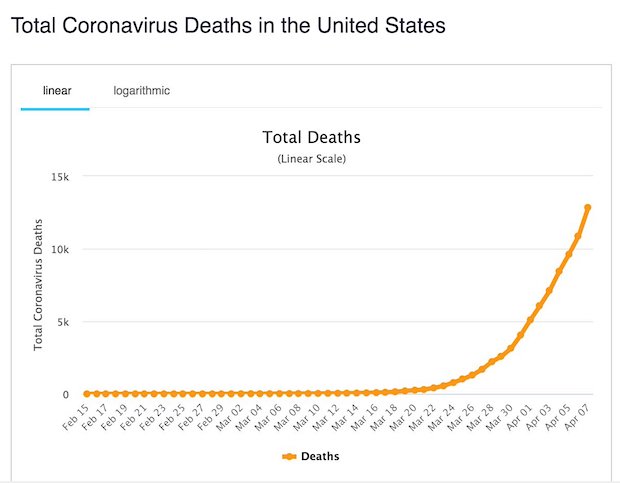

I haven’t seen any genetic explanations for this.
• Cuomo, De Blasio Urged To Act On ‘Uneven’ COVID19 Death Toll (TheCity)
Responding to signs that coronavirus is exacting an outsize toll on black and Latino New Yorkers, elected officials are stepping up pressure on Mayor Bill de Blasio and Gov. Andrew Cuomo to disclose details — and act. On Monday, 10 South Bronx elected officials asked Cuomo to immediately open a multipurpose medical facility at the Harlem River Yards, a waterfront site owned by the state. Their letter cites THE CITY’s report on an outsize death toll from the Bronx, using city Health Department statistics. As of last Friday, Bronx residents were twice as likely to die of coronavirus as New York City residents as a whole.
The officials, among them veteran Rep. José Serrano, asked Cuomo to establish a rapid testing facility, field hospital, and temporary barracks for medical personnel on the property, currently leased to the Schenectady-based Galesi Group. “If New York State can not accommodate this request, we ask that you convey the rationale as to why and that you request assistance from the federal government to activate this proposal,” they wrote. “We fear that a lack of adequate response to COVID-19 in our community will lead to a record number of deaths associated with New York City’s most vulnerable and even further health disparities.”
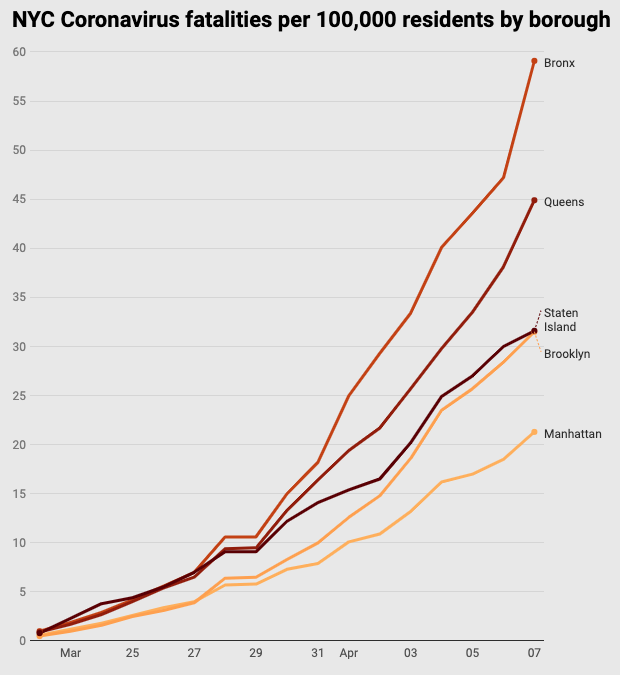
And it appears the outbreak may be growing increasingly deadly. Not only does The Bronx have the highest number of fatalities as a share of its population of any borough — its death rate is also growing the fastest, THE CITY’s analysis of city Health Department data suggests. In the Bronx, about 84% of residents are black, Latino or mixed race, Census data show, compared with 39% in Manhattan, the borough with the lowest death rate.
[..] In other large locales, demographic data has shown that low-income and black and Latino communities are being disproportionately affected: In Chicago, for example, 61 of the 86 deceased — 70% — were black, NPR affiliate WBEZ reported Sunday. Black residents make up less than one-third of Chicago’s population. In Louisiana, around 70% of the dead are black, the state’s department of health reports, while roughly 33% of the state is black. About 4-in-10 of those dead in Michigan are black, Michigan Radio reports, though 12% of the state is black.

US death total is 12,901. Both countries reported their first case on the same day in January.
• South Korea Virus Death Toll Hits 200 (Yonhap)
South Korea’s death toll from the new coronavirus has reached 200, and most virus victims are elderly patients with underlying diseases, health authorities here said Wednesday. An additional eight patients died of COVID-19 on Tuesday, bringing the country’s fatality number to 200, according to the Korea Centers for Disease Control and Prevention (KCDC). The country added 53 new cases, bring total virus cases to 10,384 as of Wednesday. The country reported its first death from the novel coronavirus on Feb. 20 and breached the 100 mark on March 22. Most of the victims have been elderly patients with underlying illnesses, such as cancer and pneumonia.
KCDC data showed the mortality rate of COVID-19 patients aged 80 or older stood at 20.43 percent as of Tuesday, compared with an average mortality rate of 1.93 percent. The mortality rate of COVID-19 patients aged 80 or older was a mere 3.7 percent on March 2 when health authorities began conducting such a tally but increased to 10 percent on March 20 and breached the 20 percent level as of Tuesday, the KCDC said. Health authorities said the fatality rate among elders is relatively high due to massive cluster cases at nursing hospitals where patients with underlying diseases, such as dementia, have been treated. “Diagnosis is relatively slower at nursing hospitals, which could lead to a higher mortality rate,” said Kim Woo-ju, an infectious disease specialist at Seoul’s Korea University Hospital.

Big Pharma looking out for no. 1.
• CDC Removes Unusual Guidance To Doctors About Chloroquines (R.)
The U.S. Centers for Disease Control and Prevention has removed from its website highly unusual guidance informing doctors on how to prescribe hydroxychloroquine and chloroquine, drugs recommended by President Donald Trump to treat the coronavirus. The move comes three days after Reuters reported that the CDC published key dosing information involving the two antimalarial drugs based on unattributed anecdotes rather than peer-reviewed science. Reuters also reported that the original guidance was crafted by the CDC after President Trump personally pressed federal regulatory and health officials to make the malaria drugs more widely available to treat the novel coronavirus, though the drugs in question had been untested for COVID-19.
Initially, the CDC webpage, titled Information for Clinicians on Therapeutic Options for Patients with COVID-19, had said: “Although optimal dosing and duration of hydroxychloroquine for treatment of COVID-19 are unknown, some U.S. clinicians have reported anecdotally” on several ways to prescribe the medication of COVID-19. Medical specialists had told Reuters they were surprised by that language. “Why would CDC be publishing anecdotes?” asked Dr. Lynn Goldman, dean of the Milken Institute School of Public Health at George Washington University. “That doesn’t make sense. This is very unusual.”
Doctors and other health experts had further criticized the guidance as suggesting that doctors might prescribe the medications when it isn’t established whether or not they are effective or harmful. Now the CDC website no longer includes that information. Instead, its first sentence says: “There are no drugs or other therapeutics approved by the US Food and Drug Administration to prevent or treat COVID-19.” The updated, and shortened, guidance adds that “Hydroxychloroquine and chloroquine are under investigation in clinical trials” for use on coronavirus patients.

What does it take to break it?
• EU Ministers Fail To Agree Virus Economic Rescue In All-Night Talks (R.)
European Union finance ministers failed to agree in all-night talks on more support for their coronavirus-hit economies and their chairman said on Wednesday morning he was suspending the discussions until Thursday. Diplomatic sources and officials said a feud between Italy and the Netherlands over what conditions should be attached to euro zone credit for governments fighting the pandemic was blocking progress on half a trillion euros worth of aid. “After 16 hours of discussions we came close to a deal but we are not there yet,” Eurogroup chairman Mario Centeno said. “I suspended the Eurogroup and (we will)continue tomorrow.”
The finance ministers, who started talks at 1430 GMT on Tuesday that lasted all night with numerous breaks to allow for bilateral negotiations, are trying to agree a package of measures to help governments, companies and individuals. They had hoped to agree on a half-trillion-euro programme to cushion the economic slump and finance recovery from the pandemic, and turn a page on divisions that have marred relations as the bloc struggles with the outbreak. But feuds emerged prominently again, one diplomatic source said: “The Italians want a reference to debt mutualisation as a possible recovery instrument to be analysed more in the future. The Dutch say ‘no’.” An official who participated in the talks said at around 0400 GMT on Wednesday The Hague was the only one refusing to endorse a text that the ministers were expected to agree on to get endorsement for a new set of economic measures from the bloc’s 27 national leaders.
German Finance Minister Olaf Scholz said on Twitter: “In this difficult hour Europe must stand together closely. Together with (French finance minister) Bruno Le Maire, I therefore call on all euro countries not to refuse to resolve these difficult financial issues and to facilitate a good compromise – for all citizens.” Issuing joint debt has been a battle line between economically ailing southern countries like Spain and Italy and the fiscally frugal north, led by Germany and the Netherlands, since the financial and euro zone crises began over a decade ago.
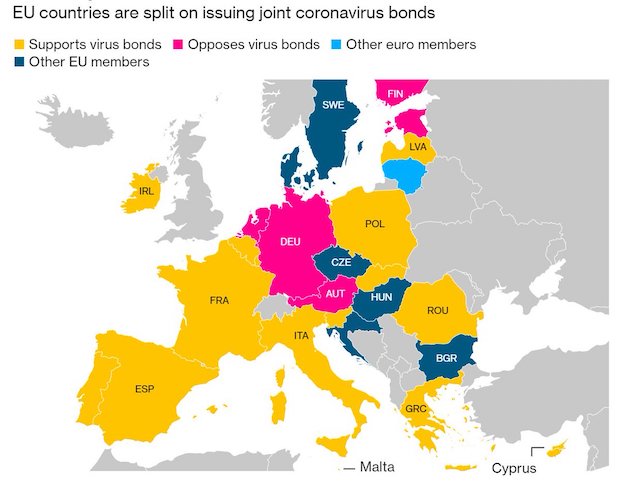

Here’s thinking there will be huge changes that Kudlow has no idea about.
• US Economy Will Eventually Reopen But With Big Changes: Kudlow (R.)
The Trump administration is aiming to reopen the U.S. economy when the nation’s top health experts give the go-ahead, but Americans’ lives will be drastically different, White House economic adviser Larry Kudlow said on Tuesday. Even when people in the United States return to work and school, they will likely have to stay home when they have signs of sickness, face more widespread and ongoing testing and submit to routine temperature taking, he told Politico in an interview. “We are aware that things are going to be different,” he said. “That’s going to be a new feature of American life. And I don’t know how quickly that gets up and going, but it’s going to be very, very important because we obviously want to prevent any recurrences.”
It remains unclear when the country, which remains largely shuttered amid the ongoing outbreak that has crushed the economy, will resume more normal operations as a number of states approach their potential peak number of cases amid federal guidelines to isolate until the end of April. [..] “It is the health people that are going to drive the medical decisions, here, the medical-related decisions,” Kudlow told Politico, adding that he still believes “that in the next four to eight weeks we will be able to reopen the economy and that the power of the virus will be substantially reduced and we will be able to flatten the curve.”

I gave up counting.
• Worldwide Debt Reached 322% of GDP Before COVID19 Pandemic (Sky)
Worldwide debt reached 322% of GDP last year, according to new figures which will worry governments planning post-coronavirus economic recoveries. Worldwide debt across all sectors rose by $10trn (£8trn) in 2019 to more than $255trn (£206trn), and that was before COVID-19, which forced many of the world’s governments to bail out businesses and to pay workers in an effort to help them survive the pandemic. By the end of last year, global debt stood at 322% of GDP – 40 percentage points higher than at the beginning of the 2008 financial crisis, according to the Institute of International Finance’s Global Debt Monitor.
The IIF forecast that the global debt burden would rise “dramatically” in 2020, with gross government debt issuance soaring to a record high of more than $2.1trn last month – more than double the average of $0.9trn in 2017-19. A global recession is looming, the monitor said, adding that this would begin with $87trn more of global debt than there was at the onset of the 2008 financial crisis. The news will worry world leaders as they continue to commit unprecedented financial stimulus to support their economies. Debt levels could climb to 342% of GDP by the end of this year, assuming a doubling of net government borrowing and a 3% contraction in global GDP, the monitor said.

A good man. He’s free, he lives in Belgium. I guess maybe Ecuador literally is a banana republic?
• Former Ecuador President Correa Sentenced To 8 Years For Corruption (R.)
An Ecuadorian court sentenced former president Rafael Correa on Tuesday to eight years in prison after finding him guilty of corruption charges. Correa, who was in office from 2007 to 2017, left Ecuador three years ago and now lives in Belgium. He and 19 others, including his vice president who is in prison for another corruption case, were accused of accepting $7.5 million in bribes in exchange for public contracts to finance his party’s electoral campaigns between 2012 and 2016. The court also banned Correa from participating in politics for 25 years.
The prosecution accused Correa of heading a “criminal structure” and asked for the maximum sentence. The former leader has denied the prosecution’s accusations, saying they are a political attack by current President Lenin Moreno, who Correa initially backed in 2017. “Well, this is what they were looking for: using justice to achieve what they never could at the ballot box. I am fine. I am concerned about my colleagues,” Correa said on his Twitter account.

State sanctioned murder. Because of COVID19, Assange can’t talk to his lawyers, he can’t participate in his own trial. We can wish for Boris to die a painful COVID death, but there are a hundred just like him waiting in the wings, so it wouldn’t make any difference.
• Assange’s Life In Grave Danger After 1st COVID19 Death In Belmarsh Prison (RT)
Conditions in Belmarsh prison, where Julian Assange is held, might be worse than London is willing to admit, WikiLeaks editor-in-chief Kristinn Hrafnsson told RT, adding that Covid-19 could swiftly tear through the facility. A prison environment is “like a Petri dish” for a virus, Hrafnsson explained, particularly such a highly infectious one as the novel coronavirus, which has already struck more than 1 million people around the world. The max security Belmarsh prison, where the WikiLeaks founder is being kept pending extradition to the US, has just reported its first death from the disease. According to Hrafnsson, there are other worrying signs too. “We have prison guards going in and out. A third of them at least are not showing up to work either because they have the virus or because they are in isolation.”
He also said he was sure the number of inmates who contracted Covid-19 in Belmarsh is “undoubtedly higher than reported,” since prison authorities have simply not conducted enough tests on the population to “know what is going on exactly.” The situation is particularly alarming for Assange, who was in a rather poor state of health even before the outbreak of the deadly disease, Hrafnsson added. “Assange is in very bad shape. He is a very vulnerable individual, especially to a virus like Covid-19. He has an underlying lung condition and would be considered at great risk even if living normally in society. He is in a situation when his life is in danger every day and every hour.”
The Wikileaks editor-in-chief said that British authorities are outright neglecting their duties by leaving Assange — as well as other prisoners — behind bars, given the current circumstances. Hrafnsson also slammed a British judge’s decision to carry on with Assange’s extradition hearing amid the ongoing pandemic, as though nothing has been happening. The Wikileaks founder is unable to take part in any court sessions now as he has to be moved through the infected prison each time he is about to do that, even via a video link. Assange’s lawyers also have lost all contact with their client for about three weeks at this point, since they cannot visit him prison and cannot talk to him by video chat either, the Wikileaks editor-in-chief said.

The UK manages to sink deeper on all fronts.
• Judge Refuses To Grant Julian Assange’s Partner Anonymity (Ind.)
A judge has refused to grant legal anonymity to Julian Assange’s partner after hearing claims the US had tried to obtain their children’s DNA. Representatives of the Wikileaks founder submitted evidence to Westminster Magistrates’ Court claiming that American agencies had expressed interest in testing nappies discarded when Mr Assange’s partner and children visited him at the Ecuadorian embassy. District Judge Vanessa Baraitser found that, even if the allegation were true, there was no reason to believe US agencies meant to harm his young family. She referred to the claim while rejecting the bid to anonymise Mr Assange’s partner, who the court heard wishes to live “quietly” with her young children away from publicity.
Following a submission by the Press Association news agency to the court, Judge Baraitser ruled that the woman’s right to a private family life was outweighed by the need for open justice. But the judge delayed making the woman’s identity public until 4pm on 14 April, pending a possible judicial review at the High Court. Mr Assange was previously denied bail amid concerns over the spread of coronavirus in British jails, and the application had been supported by the unnamed woman. The 48-year-old is being held on remand at HMP Belmarsh, in south-east London, ahead of an extradition hearing on 18 May. During the virtual hearing, the judge also rejected a bid to delay the hearing because of the coronavirus crisis.
Mr Assange’s barrister, Edward Fitzgerald QC, said there were “insuperable” difficulties preparing his case because of the pandemic, and requested an adjournment until September. He told the court that he had not been able to see Mr Assange in jail and could see “no viable” way his client could be present in court to hear witnesses. On Mr Assange’s mental state, he told the judge: “There are difficulties of the pandemic with the defendant himself. You are aware … he has well documented problems of clinical depression.” Mr Assange’s treatment was on hold during the lockdown and he had been unable to see his family. Mr Fitzgerald said: “In those circumstances, in his vulnerable condition, to force him to enter a full evidential hearing in May, we respectfully submit it would be unjust. We respectfully submit it would be oppressive.”

It must be possible to run the Automatic Earth on people’s kind donations. These are no longer the times when ads pay for all you read, your donations have become an integral part of the process.
Thanks everyone for your generous donations.

John Prine – Sam Stone https://t.co/HZ7quLVD4X via @YouTube
— Suburban Guerrilla Ω (@SusieMadrak) April 8, 2020

'My little girl thinks that Santa has sent the reindeer:' Residents of a London suburb enjoy the company of a herd of friendly deer pic.twitter.com/PUMe9Nws05
— Reuters (@Reuters) April 8, 2020

One for the stay home fitness crowd:


Support the Automatic Earth in virustime. It’s good for your health.





